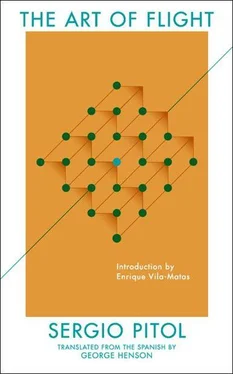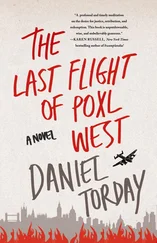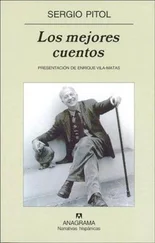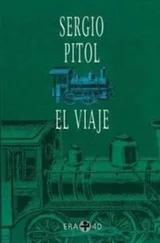Night falls. A bus drops us at the corner of the Chapultepec movie house, just a short walk from where Arreola lives. When we arrive, he complains about our delay. José Emilio is about to leave. We convince him to stay awhile. Arreola is also about to leave. He has committed to attending the premier of Pirandello’s Henry IV at Bellas Artes. He assures us that the next day he’ll take the proofs to press. Our Cuadernos will appear very soon. He shows us a few sheets of stunning Dutch paper and gives us a lesson on watermarks. It’s obvious that he’s in a hurry to leave, but he agrees to sit for a moment to chat. He urges Carlos to submit material for a Cuaderno . José Emilio and I mention that he has a magnificent story. In unison we shout: “Fino acero de niebla!” Carlos bursts out laughing, covers his face with a cushion, and then promises vaguely that he’s revising something he’s about to finish. Arreola begins to talk about Pirandello, recalling the staging of his works when the great Italian companies toured Mexico; the best, according to him, was that of Mimi Agugli. He then turns to Louis Jouvet; he did not miss a single performance when his company was in Mexico, or in Paris, when he lived there. Theater is the genre that combines all literary perfections, he declares; he suddenly stands, marches around the room, and recites entire scenes while imitating all the characters from Farce of the Chaste Susana by Diego Sánchez de Badajoz; later, he retracts, in no way is theater the most important genre, such a claim is an aberration; he then discusses poetry and thereafter takes out a volume of Proust and reads to us, in perfect French, the chapter in which Albertine is surprised while asleep. Suddenly, a young man, visibly irritated, who has been listening to him, and who has remained silent throughout our stay, stands and barks that if he and Arreola do not leave at once they’ll never make curtain time. We all go out into the street. Arreola and his companion get in a taxi, and the three of us — José Emilio, Carlos, and I — walk up the Paseo de la Reforma, turn right on Niza, and walk to a taquería next to the Insurgentes movie house, where we would often go at night to eat soup and sample the most delicious selection of tacos imaginable. While we eat, we return to the subject of literature, each of us reiterating our preferences. To the usual names, we add others: Alejo Carpentier and Juan Carlos Onetti, and, thanks to José Emilio, poets are also introduced: Quevedo, Garcilaso, López Velarde, Neruda, Vallejo, Huidobro, the Generation of ’27. José Emilio eats quickly and says goodbye; he has to turn in a translation the next day. Some writers we barely know approach our table to sit and chat. They’re obsessed with defining the topics our generation is obligated to address. They begin to enumerate their projects; they know what they must do for the next five years at least. We eat without paying too much attention to the ambitions of our newly arrived guests. Later, we discuss a fabulous book, James Boswell’s The Life of Samuel Johnson, LL.D. , in which both biographer and biographee appear alternately as the remarkable characters they were, but they also prefigure traits belonging to Mr. Pickwick or, closer to home, to the comic strip character Don Reginito Burrón, which makes its reading even more enjoyable. We also discuss detective novels to avoid the formulaic and insipid conversation that dominates the table, and only out of politeness do we answer the questions that our acquaintances occasionally ask, without telling them that the only project that interests us is writing a satirical novel in which we would portray them as a bunch of grotesque and pompous idiots.
Perhaps we’re aware that we’ll never write a line of that novel, but perhaps we also sense that such a daily game can be one of the sources that will inspire our later work, that is if it is ever written. We cannot foretell the future, nor do we want to; the only thing that matters to us is the present and the immediate future; to think, for example, about what the coming days offer, how the complex situations that each of us confronts in his personal life will unravel, and with the same intensity, what books we will read in the days to come.
THE RETURN HOME
I return to Mexico in mid-1962. I’m excited to get back to my old habits and haunts. Nevertheless, I do everything possible to return to Italy. I do not have steady employment; I manage on a hodgepodge of jobs I do at home. After the absolute freedom I enjoyed in Rome, the idea of going back to an office is difficult for me to accept. During this time, I translate The Monk , the gothic novel by M.G. Lewis, which is published in installments in Salvador Elizondo’s magazine Snob . I do readers’ notes for Joaquín Díez-Canedo. Max Aub has given me small jobs at Radio Universidad: snippets to celebrate the anniversaries of famous writers; I also participate in a book review program, also at Radio, with Rosario Castellanos, José Emilio Pacheco, and Carlos Monsiváis. The Coordination of Cultural Diffusion, which oversees Radio Universidad, is enjoying a golden age under the direction of Jaime García Terrés. To start with, there is no censorship. Rosario Castellanos adds a very informal character to the program; everyone is able to express his or her opinion with no strings attached. We celebrate on the program the release of Carlos Fuentes’s The Death of Artemio Cruz ; we dust off the work of Martín Luis Guzmán, which of late the author himself has not even paid much attention to. We discuss the new postwar Spanish narrative, the existence of which has been difficult to accept in Mexico. The prevailing opinion is that since the fall of the Republic it is impossible for anything worthwhile to emerge; that a new literature can only be born with the disappearance of Franco. Discussing, much less praising, new authors like Sánchez Ferlosio, Goytisolo, Martín-Santos, Aldecoa, bothers a lot of people who believe that to do so legitimizes the Franco regime. It’s a nuisance but it’s impossible to compromise with this kind of intolerance.
Since that day in 1957 I described before, many things have happened: there have been shockwaves that have provoked reactions against the government apparatus and its institutions; unexpected social movements have arisen; labor leaders have emerged who question the old codgers immobilizing the social organism. Corruption was condemned in many areas. There were protest marches and strikes nationwide; railway workers, teachers, telephone operators, and other union groups filled the streets and took control of them. There were impressive demonstrations. I remember one organized in support of teachers in which the participation of intellectuals was particularly important; there were not only young people but also those we considered our teachers. In a row ahead of Monsiváis and me were Octavio Paz and Carlos Fuentes, both functionaries of the Foreign Service. We marched in front of the Secretariat of Foreign Affairs just as the employees were leaving. Some diplomats applauded when they saw their colleagues in the march; others, horrified, could not believe their eyes.
The response was immediate: a disproportionate crackdown. From 1958 to 1960 riot police seemed to take control of the city, surprised, perhaps, by the obstinacy of students and workers who, in spite of the beatings, arrests, and torture, continued to express their dissatisfaction, handing out fliers, marching in the streets, singing subversive songs, ridiculing the government. The jails filled with political prisoners. Monsiváis, José Emilio, a dozen other writers, and I went on a hunger strike called by José Revueltas, in solidarity with the strike that Siqueiros and other political prisoners had undertaken in Lecumberri. We were living day to day, with a recklessness that could only be attributed to naïveté. We took for granted that nothing would happen to us, and it was senseless to worry beforehand. We did not possess a desire to be martyrs — on the contrary. Personally, the experience helped me to rid myself of a feeling of over-protection that was beginning to hinder me. Somehow we understood that the country needed changes, that the political institutions were rusty, that it was unhealthy for a nation to be perpetually governed by a single party. But we did not expect the violent reaction from the groups in control. They were only able to respond to dialogue with beatings, arrests, and even murder.
Читать дальше












